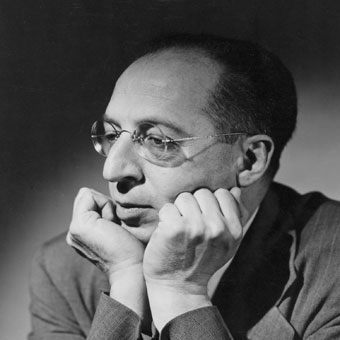
Aaron Copland
d. 2 December 1990, N.Tarrytown, New York
Short Biography:
Aaron Copland's name is synonymous with American music. It was his pioneering achievement to break free from Europe and create concert music that is characteristically American. In addition to writing such well-loved works as Fanfare for the Common Man, Rodeo, and Appalachian Spring, Copland conducted, organized concerts, wrote books on music, and served as an American cultural ambassador to the world.
While studying with Nadia Boulanger in Paris, Copland became interested in incorporating popular styles into his music. Upon his return to the US, he advanced the cause of new music through lectures and writings, and organized the famed Copland-Sessions concerts.
As America entered first Depression then war, Copland began to speak to the concerns of the average citizen in those times of trouble. His intentions were fulfilled as works from Billy the Kid to Lincoln Portrait to the Pulitzer Prize-winning Appalachian Spring found both popular success and critical acclaim.
Aaron Copland was one of the most honored cultural figures in the history of the United States. The Presidential Medal of Freedom, the Kennedy Center Award, the National Academy of Motion Picture Arts and Sciences "Oscar", and the Commander's Cross of the Order of Merit of the Federal Republic of Germany were only a few of the honors and awards he received. In 1982, the Aaron Copland School of Music was established in his honor at Queens College of the City University of New York.
Aaron Copland is published exclusively by Boosey & Hawkes.
Long Biography:
Aaron Copland's name is synonymous with American music. It was his pioneering achievement to break free from Europe and create concert music that is characteristically American. At the same time, he was able to stamp his music with a compositional personality so vivid as to transcend stylistic boundaries, making every work identifiable as his alone.
Born in Brooklyn, New York in 1900, Copland set out for Paris in 1920 to study with luminary pedagogue Nadia Boulanger. Among the many vital legacies of his stay in Paris were a growing interest in popular idioms and the insight that there was as yet no American counterpart to the national styles being created by composers from Europe. He became determined to create, in his words, "a naturally American strain of so-called serious music."
Upon his return to America in 1924, his career was launched when Serge Koussevitzky agreed to conduct the Boston Symphony Orchestra in Copland's Organ Symphony. But Copland saw a broader role for himself than mere iconoclast. He sought to further the cause of new music as a vital cultural force. He accomplished this not only by composing, but also by lecturing and writing on new music, and by organizing the groundbreaking Copland-Sessions concerts in New York, which brought many works of the European avant-garde to US audiences for the first time.
As America entered Depression and then war, Copland began to share many of his fellow artists' commitment to capturing a wider audience and speaking to the concerns of the average citizen in those times of trouble. His intentions were fulfilled as works from Billy the Kid to Lincoln Portrait to the Pulitzer Prize-winning Appalachian Spring found both popular success and critical acclaim.
Copland never ceased to be an emissary and advocate of new music. In 1951, he became the first American composer to hold the position of Norton Professor of Poetics at Harvard University; his lectures there were published as Music and Imagination. For 25 years he was a leading member of the faculty at the Berkshire Music Center (Tanglewood). Throughout his career, he nurtured the careers of others, including Leonard Bernstein, Carlos Chavez, Toru Takemitsu, and David Del Tredici. He took up conducting while in his fifties, becoming a persuasive interpreter of his own music; he continued to conduct in concerts, on the radio, and on television until he was 83.
Aaron Copland was one of the most honored cultural figures in the history of the United States. The Presidential Medal of Freedom, the Kennedy Center Award, the National Academy of Motion Picture Arts and Sciences "Oscar", and the Commander's Cross of the Order of Merit of the Federal Republic of Germany were only a few of the honors and awards he received. In addition, he was president of the American Academy of Arts and Letters; a fellow of the Royal Academy of Music and the Royal Society of Arts in England; helped found the American Composers Alliance; was an early and prominent member of the American Society of Composers, Authors, and Publishers; served as director or board member of the American Music Center, the Koussevitzky Foundation, the League of Composers, and other organizations; received honorary doctorates from over 40 colleges and universities. In 1982, the Aaron Copland School of Music was established in his honor at Queens College of the City University of New York.
Aaron Copland is published exclusively by Boosey & Hawkes.
This biography can be reproduced free of charge in concert programmes with the following credit: Reprinted by kind permission of Boosey & Hawkes
